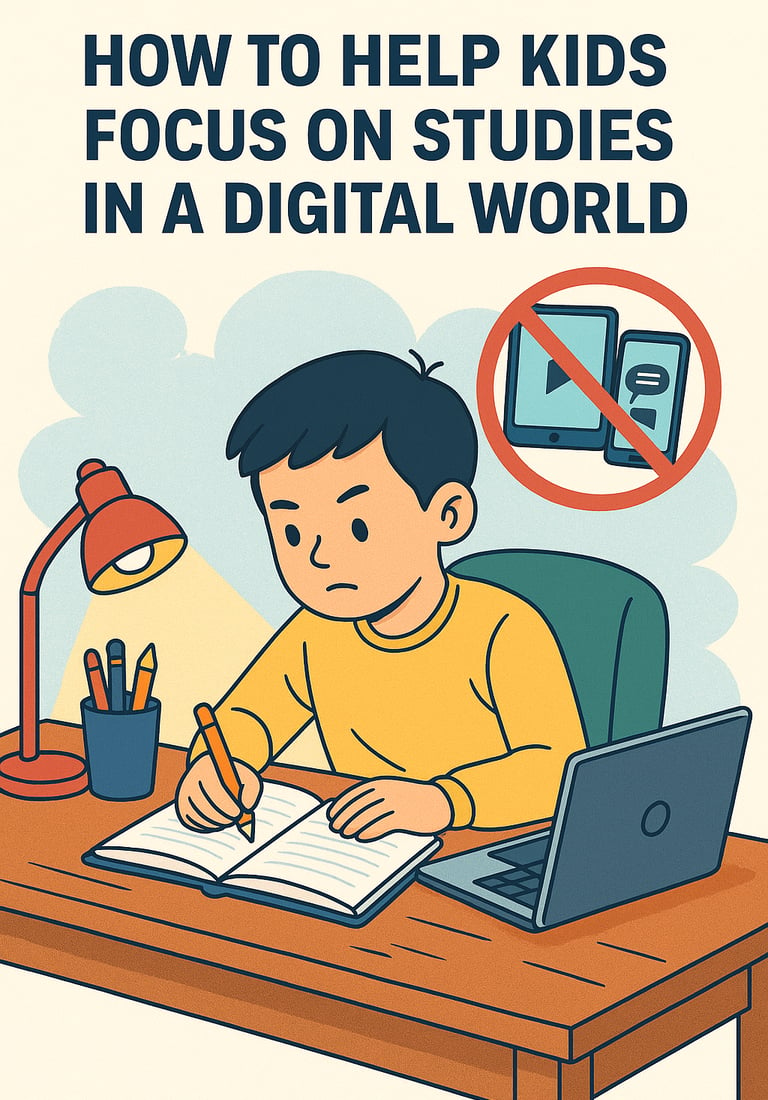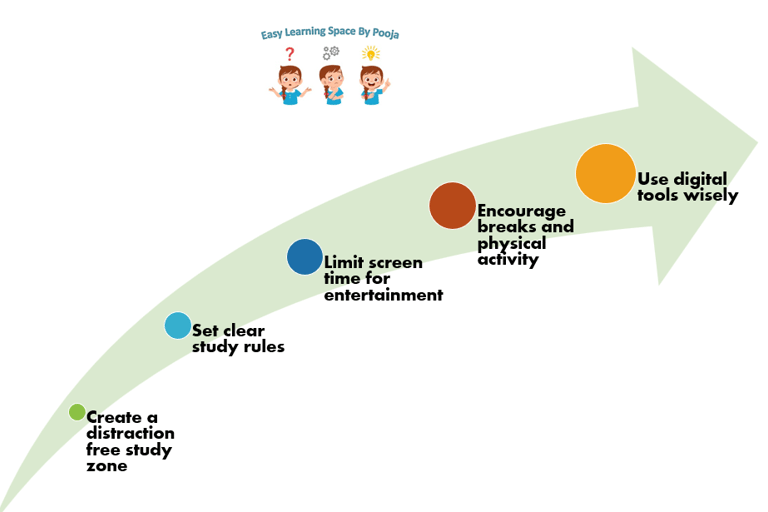How to Help Kids Focus on Studies in a Digital World
Discover practical ways to help kids focus on studies in a digital world. Simple tips for parents & teachers to reduce distractions and boost learning
PARENTS, TEACHERS, PARTNERS, EDUCATION, LEARNING, TEACHING, COLLABORATION
Pooja
7/16/20255 min read


The kids we were and the kids we have!
Did you know the average child spends over 6 hours a day in front of screens? Between online classes, gaming, and endless YouTube videos, keeping kids focused on their studies has never been more challenging. As parents and teachers, we need practical strategies to balance digital life and learning. In this guide, you’ll find simple, realistic tips to help your child build focus, reduce distractions, and develop healthy study habits in a tech-driven world.
My son and me have long conversations during our bedtime. I have heard that if you and your kids share long and detailed talks just before their bedtime, it is supposed to be very healthy for two reasons.
1. It helps the kid to release all the internal stress they have.
2. It makes them feel safe. They now know that they are in the safest zone, comfort of their space with the most loved person by their side.
This is the time when you can strike gold with them ensuring they open up to you like never before. In my experience, always share your childhood stories with your kids. It helps them to co-relate and also compare their life with ours. It subconsciously helps them to develop gratitude (I hope they do).
So, I started telling my son that one day in school we were given the assignment of finding about the unsung heroes of our freedom struggle. We were in Grade 6, and we had only three days to write an essay on the people who were revolutionary hero's, whose names are not popularly mentioned in our history books. I told him we formed teams and started to search in our school library. We searched every possible book, got clues, read in between lines, marked the name and searched in other books from the clues we got in the previous books.
With all the excitement that I could gather I told him that we were highly appreciated by our teacher and together all the students in our class could gather almost 17 unsung heroes of our freedom struggle. Falling short of my breath I was smiling and looking at him for some reaction after exhibiting my best story telling skills, only to get a sigh from his mouth. He calmly said "Why did you work so hard? You could have just Googled. Also, you could have typed some rare keywords which would give you the best answers and not common answers".
The rage I felt in that moment, (a millennial mom, raising a Gen Alpha child) cannot be explained. Google? keywords? Seriously? Well how do I explain my son what fun it was to do such activities. How do I tell him there was world that existed before Google. We all have grown up without typing keywords and looking for readymade answers. We READ! We actually read so many books not only related to our subjects but also for fun. Anyways, after having a meltdown in my mind for few seconds, I told him that Google did not exist back then, and we had to read books and literally run around marking up the newspapers and other books to get information. Gave him a heads up saying that during dinner we (my mum, dad and me) watched Doordarshan NEWS and discussed current affairs.
I wish I could record his reaction when I told him we did not have Google. He asked me with a straight face "How did you guys manage your life without Google". Did you have physical maps for locations?" I said a simple "yes". Decided to move on from this conversation and get to the point of conversation which we were having that day.
Today's children are growing up in the lap of technology. They have a lot of information at their disposal, at their fingertips. Technology makes our life very easy no doubt, there is also no denying the fact that it does complicate our lives as well. Especially for our children who are growing up around it.
How do we handle this problem? How can we try and find our way around restricting technology especially around tender growing up children? With some experience, observation, tried and tested methods, below I have listed a few things that might help you. Some of them have really helped me.
1.Set Clear Study Times & Breaks
Children focus better when they know what to expect. Fix a daily study routine — for example, one hour of study, then a 10–15-minute break. Short, timed study blocks work well for younger children. Use timers or study planners to make it fun and easy to follow. Now, the key here is consistency. There are no amendments to this rule.
2.Create a Distraction-Free Study Zone
Designate a quiet, clutter-free study area at home. Make sure the TV is off, unnecessary gadgets are away, and only study materials are at hand. If online classes or resources are needed, sit with them at times to ensure they stay on track.
Instead of banning devices, show kids how to use technology to help them study.
Use educational apps for practice.
Try online quizzes or learning games that reinforce what they’re studying.
Introduce parental control apps to block distracting sites during study time.
3.Use Tech Positively
Instead of banning devices, show kids how to use technology to help them study.
Use educational apps for practice.
Try online quizzes or learning games that reinforce what they’re studying.
Introduce parental control apps to block distracting sites during study time.
4.Teach One Task at a Time
Multitasking is a myth — especially for kids! Teach them to finish one subject or topic before jumping to the next. Break big tasks into smaller steps so they don’t feel overwhelmed.
5.Be a Role Model
Children learn by watching adults. Avoid checking your phone constantly when you’re with them during study time. Show them that you, too, can put your devices aside when focusing on work or reading.
6.Encourage Regular Physical Breaks
A tired body means a restless mind. Let kids move around during breaks — simple stretches, jumping jacks, or a quick walk helps release extra energy and refreshes their focus.
7.Use Positive Reinforcement
Praise and reward children when they stick to their study time without distractions. Small rewards — like stickers, extra playtime, or their favorite snack — can motivate them to keep good habits.
8.Talk Openly About Digital Distractions
Explain why too much screen time or distractions can affect their studies and eyes. Discuss together how they can balance fun screen time and focused study time.
9.Stay Connected With Teachers
Teachers often have insights into a child’s focus patterns. If you’re a parent, check in with your child’s teachers regularly to understand their strengths and challenges.
Final thoughts:
Helping kids stay focused on studies in this digital age is not about removing technology altogether — it’s about teaching them to use it wisely and build self-discipline. With clear routines, a supportive environment, and patient guidance, your child can develop strong focus skills that will help them succeed in school and life.
Clear communication between your child and you are very important. Yes, it can be hard but winning over children's confidence and trust is very important for the parent. You need cushion their thought process with a lot of love and mutual trust. Protecting our children from over consumption of digital media should be one of our top priorities as parents.
Do you have thoughts on this? Would you like me to add something to the above-mentioned points? Please share your ideas as well. I will compile all the ideas and edit this blog again! Waiting for your response!
With Love
Pooja




Address
Pooja
Bangalore
Contacts
easylearningspacebypooja@gmail.com
Subscribe to our newsletter
This blog is for educational purpose only
All the information on this website – www.easylearningspace.com – is published in good faith and for general educational and informational purposes only. I aim to provide helpful teaching tips and resources, but I make no warranties about the completeness, reliability, and accuracy of this information.
Any action you take upon the information you find on this website is strictly at your own risk. I will not be liable for any losses
